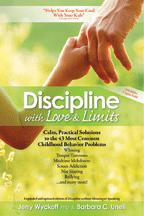
Barbara Unell traces her motivation for writing about parenting back to her favorite childhood song, “Little Wendy Why Why,” and two books, “The Little Engine That Could” and “Pollyanna.”
That initial spark has helped propel Unell through co-authoring 15 books, six of which are about parenting. Her latest one, which she co-authored with Jerry Wyckoff, is titled “Discipline with Love & Limits.” They started working on it about a year ago. It’s the second revision of a book they co-wrote that was first published in 1984 and titled “Discipline without Shouting or Spanking,” which sold more than 1 million copies, she said.
“We were asked to revise “Discipline without Shouting or Spanking” by the publisher in late 2014,” Unell said. “As we started to research that and work on it, we became really excited about some of the new research on brain science and new developments in early childhood education and who was raising today’s toddlers, and about the harmful effects of spanking on babies, toddlers, preschoolers and (people) all the way through adulthood — everything from learning problems to cancer to heart disease to depression.”
She cited the Adverse Childhood Experiences (ACE) Study, which the Centers for Disease Control and Prevention calls “one of the largest investigations ever conducted to assess associations between childhood maltreatment and later-life health and well-being.” The CDC and Kaiser Permanente’s Health Appraisal Clinic in San Diego collaborate on the study, which includes more than 17,000 health maintenance organization members who give details “about their childhood experience of abuse, neglect and family dysfunction.”
With “Discipline with Love & Limits,” Unell said, “I’m looking back on more than 30 years of work.”
“Some of my initial readers are now grandparents,” she said. “I feel so lucky to have been able to do this work that I’m so passionate about for so many years, and also to find people all over the world, really, who care about families and raising kids, and raising kind and responsible and respectful kids.”
Unell and her husband, Robert Unell, live in Leawood, and they’re members of The Temple, Congregation B’nai Jehudah. They’re also parents of twins who are adults. She studied psychology at the University of Texas at Austin and grew interested in “why we do what we do.” She couldn’t help but notice children’s habit of relentlessly asking questions, “and no more profound questions presented themselves than when I became a parent.”
“As my children started to have some of the normal toddler behaviors like tantrums and whining and not doing what you ask them to, I was fascinated with my having a choice as a parent,” she said. “Was I going to punish or teach? If you’re trying to build responsibility, kindness and respect in your children, it didn’t make sense to me to use power and control and aggression. That blocks the parent’s brain from being able to think and empathize with the child.”
Unell wonders why the scientific evidence about the negative effects of spanking children or otherwise creating a fearful atmosphere for them doesn’t get the same attention as the negative effects of smoking or unhealthy eating do, for example, and she wants to shed light on it with her latest book.

Along with the scientific findings, one of the big things that’s changed over the years with disciplining children involves a generational shift, she said.
“What has changed generationally is the number of children younger than 5 who spend the majority of their waking hours with someone other than their parents,” she said. “We talk in the book about team parenting, because it’s no longer the minority of families who can afford to or choose to put their kids in daycare and preschool.”
This shift includes an increasing number of single parents and two-parent working families who face limitations on family leave time at work, she said, and “it’s an unspoken, cataclysmic shift in who’s disciplining and teaching these things to children. You can’t separate these factors. They’re all part of this generational shift.”
One of the hardest parts of disciplining children involves timing, Unell said.
“At the very time that children — particularly young children — need the teaching of these appropriate behaviors, it’s the hardest time for them to learn these lessons,” she said. “There’s a surprise, I think, for so many parents when their children are infants and toddlers because parents need patience with the time it takes for their children to learn these lessons.”
Among the key lessons for parents to teach their children are delaying gratification, tolerating frustration and solving problems, she said. Her new book provides guidance in those areas and offers ways for parents to create positive relationships with their children, including parenting mindfully, reducing environmental stress, teaching children empathy and inclusivity, and managing generational conflicts between parents and grandchildren.
The book also addresses how to create an effective parenting team involving relatives, friends, teachers and babysitters. And it offers solutions to some problematic behaviors children commonly display, including whining, tantrums, screen addiction, bullying, biting, disobeying, not sharing and resisting bedtime.
As a result of having been “spoken to by many adults in somewhat dismissive terms of my being sensitive,” Unell said, “I empathize with children and adults who are sensitive and who may not be validated for that sensitivity.”
“Those qualities have been shown now to be not only valued but to be looked for in companies and employees, and to be especially important in fields such as medicine and in others, as well,” she said. “Both the giver and the receiver benefit from this approach based on kindness, empathy and respect. This is no small matter. This will make today better, but it will also make every tomorrow better, as well.”



